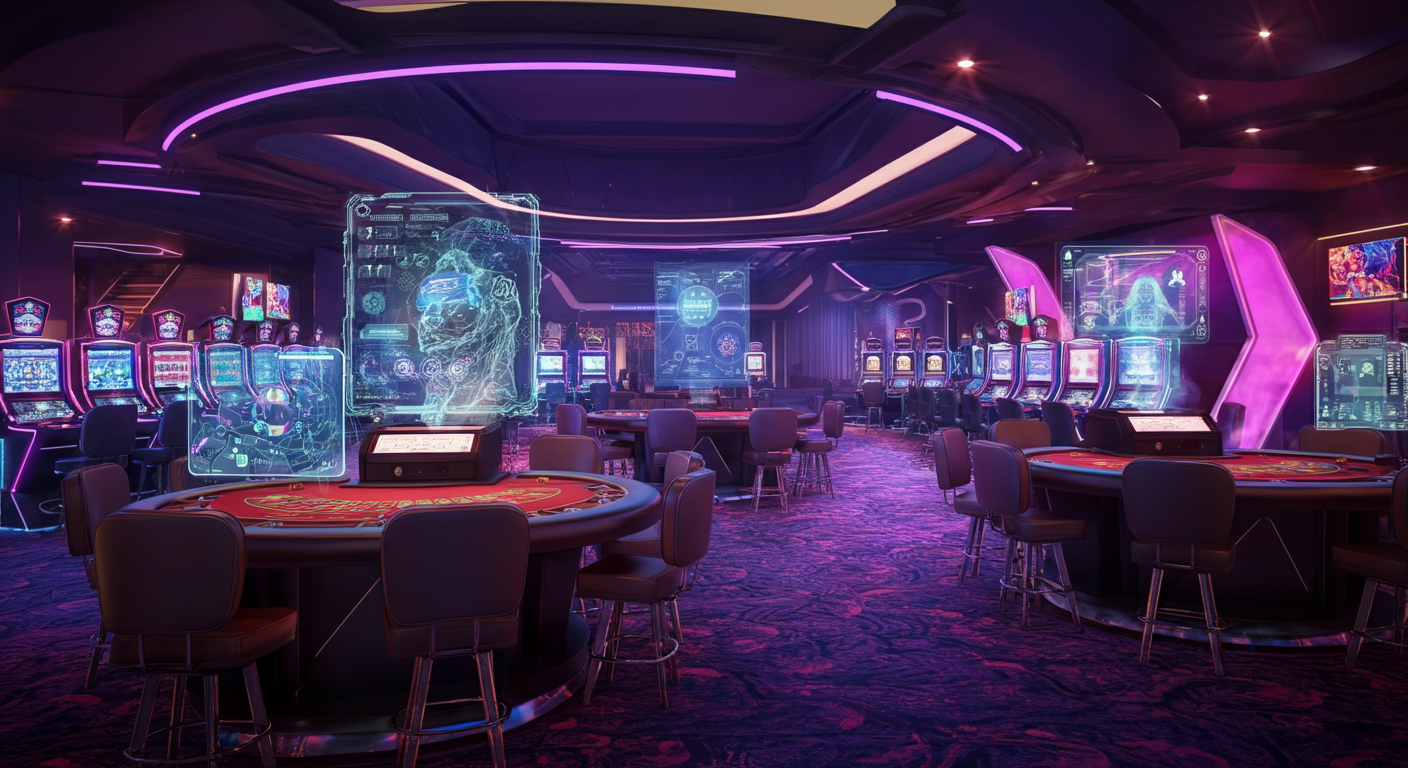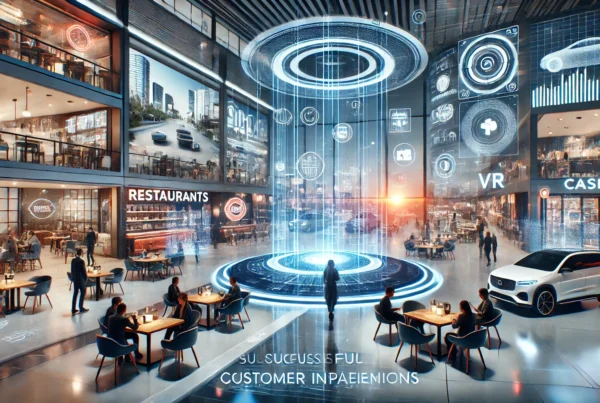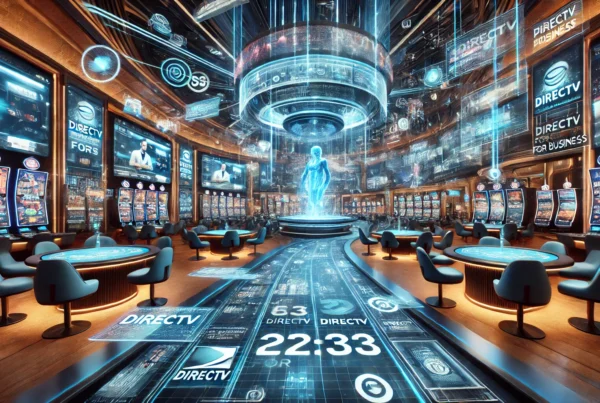In the exhilarating world of casinos, where the thrill of the game meets the pulse of technology, staying ahead means embracing innovation. The fusion of cutting-edge entertainment technologies for casinos is not just a trend—it’s a revolution reshaping the gaming landscape. Imagine stepping into a casino where augmented reality (AR) and virtual reality (VR) transform your experience, making every moment immersive and unforgettable.
For business owners and decision-makers in the gaming industry, understanding these advancements is crucial. Technologies such as artificial intelligence (AI) and blockchain are not only enhancing customer experiences but also bolstering security and operational efficiency. According to a report by Hospitality Upgrade, AI-driven analytics are optimizing loyalty programs and personalizing player interactions in real-time, while blockchain ensures secure and transparent transactions.
As casinos continue to integrate these innovations, they are poised to attract and retain a new generation of tech-savvy guests. From biometric authentication that streamlines entry to proximity-based marketing that personalizes offers, the possibilities are endless. These technologies provide a competitive edge, boosting profitability and ensuring a captivating guest experience.
In this blog post, we will explore how these cutting-edge entertainment technologies are transforming casinos into futuristic entertainment hubs. We’ll delve into the benefits they offer, the challenges of implementation, and how businesses can leverage them for success. Ready to dive into the future of gaming? Let’s explore the next wave of casino innovation.
The Role of Artificial Intelligence in Modern Casinos
In the dynamic world of casinos, artificial intelligence (AI) is a game-changer, reshaping how casinos operate and engage with their patrons. By leveraging AI, casinos are not only enhancing customer experiences but also boosting operational efficiency. This transformation is pivotal in the realm of cutting-edge entertainment technologies for casinos, offering a competitive edge in the gaming industry.
AI-driven analytics have become indispensable, providing deep insights into player behavior. These insights enable casinos to craft personalized marketing strategies that resonate with individual players, thereby increasing engagement and loyalty. Moreover, AI’s role extends beyond marketing, significantly impacting security measures and operational integrity.
Enhancing Customer Experience through Personalization
One of the most remarkable applications of AI in casinos is its ability to personalize the customer experience. By analyzing vast datasets, AI can tailor promotions and rewards to individual preferences, creating a unique gaming journey for each player. This level of personalization not only enhances player satisfaction but also boosts retention rates.
For instance, AI algorithms can identify a player’s favorite games and offer targeted promotions, encouraging more frequent visits. This approach not only maximizes player enjoyment but also increases the casino’s revenue potential. As noted by industry expert Ram Patrachari, AI’s capacity to optimize loyalty programs is transforming how casinos interact with their guests.
Strengthening Security and Fraud Detection
Security is a paramount concern for casinos, and AI is at the forefront of enhancing these measures. Advanced machine learning models continuously analyze transactional data, identifying anomalies that may indicate fraudulent activities. This proactive approach allows casinos to detect and prevent issues such as card counting and money laundering more efficiently than traditional methods.
AI’s role in fraud detection is not limited to transactional analysis. It also extends to monitoring player behavior, identifying patterns that may suggest collusion or other suspicious activities. This comprehensive surveillance capability ensures a secure environment for both the casino and its patrons, reinforcing trust and compliance.
Operational Efficiency and Predictive Maintenance
Beyond customer experience and security, AI is revolutionizing operational efficiency in casinos. Predictive maintenance, powered by AI, is a prime example of this transformation. By analyzing data from gaming equipment, AI can predict potential failures before they occur, minimizing downtime and maintenance costs.
Additionally, AI helps optimize casino floor layouts by analyzing player traffic patterns. This data-driven approach ensures that popular games are strategically placed, maximizing accessibility and player engagement. The insights gained from AI-driven analytics enable casinos to fine-tune every aspect of their operations, from staffing to inventory management.
As AI continues to evolve, its applications in the casino industry will expand, offering even more opportunities for innovation and efficiency. For business owners and decision-makers, embracing AI is not just an option—it’s a necessity to stay competitive in the rapidly changing landscape of cutting-edge entertainment technologies for casinos.
Augmented and Virtual Reality: Transforming Casino Experiences
The integration of augmented reality (AR) and virtual reality (VR) into casinos is revolutionizing the gaming experience, offering players immersive environments that enhance interaction and engagement. These technologies are at the forefront of cutting-edge entertainment technologies for casinos, providing unique opportunities to captivate and retain guests.
AR and VR are not just about flashy visuals; they are transforming how players interact with games and each other. By creating realistic and interactive environments, these technologies are setting a new standard for the gaming industry, making every visit to the casino an unforgettable adventure.
Applications of AR and VR in Casinos
AR and VR offer a range of applications in the casino setting. For instance, AR can overlay digital information onto physical gaming tables, providing players with real-time stats and interactive elements. This enhancement allows players to make more informed decisions and adds a new dimension to traditional games like poker and blackjack.
VR, on the other hand, transports players to a fully digital casino environment. Imagine stepping into a virtual casino from the comfort of your home, where you can interact with virtual dealers and other players in a lifelike setting. This technology not only replicates the physical casino experience but also introduces new possibilities for social interaction and engagement.
Benefits and Challenges of AR/VR Integration
The benefits of integrating AR and VR into casinos are manifold. These technologies enhance player engagement by offering immersive experiences that are both entertaining and interactive. They also appeal to a younger, tech-savvy audience, potentially increasing foot traffic and revenue.
However, the implementation of AR and VR comes with challenges. High development costs and the need for specialized equipment can be barriers for some casinos. Additionally, ensuring a seamless and bug-free experience is crucial to maintaining player satisfaction. Despite these challenges, the potential rewards make AR and VR a worthwhile investment for forward-thinking casinos.
Future Prospects for AR and VR in Gaming
Looking ahead, the future of AR and VR in casinos is promising. As technology advances, these experiences will become even more realistic and accessible. The integration of 5G networks and improvements in hardware will further enhance the quality and availability of AR and VR experiences.
Casinos that embrace these innovations will not only stand out in a competitive market but also set new benchmarks for the gaming industry. By leveraging AR and VR, casinos can offer a gaming experience that is truly immersive, engaging, and unforgettable, ensuring they remain at the cutting edge of entertainment technology.
Blockchain and Secure Transactions in Casinos
The casino industry is undergoing a significant transformation with the integration of blockchain technology, which is enhancing the security and transparency of financial transactions. This innovative approach is not only reshaping how casinos operate but also building trust among players and stakeholders. By leveraging blockchain, casinos can ensure that every transaction is recorded on a decentralized ledger, minimizing the risk of fraud and manipulation.
Blockchain’s potential in the casino industry extends beyond secure transactions. It offers a transparent system where all financial activities are verifiable, thus fostering a sense of fairness and integrity. This is particularly appealing to players who prioritize security and transparency in their gaming experience. As noted by industry experts, the decentralized nature of blockchain makes it difficult for hackers to access sensitive data, which is distributed across multiple nodes rather than stored in a single location.
Enhancing Security and Transparency
One of the most compelling applications of blockchain in casinos is its ability to enhance security and transparency. By using a decentralized ledger, casinos can ensure that all transactions are immutable and publicly verifiable. This not only reduces the likelihood of fraud but also increases player confidence in the fairness of the games. According to a study by the International Journal of Information Management, blockchain’s transparency is a key factor in its growing adoption in the gaming sector.
Moreover, blockchain can streamline the auditing process, as every transaction is automatically recorded and accessible for review. This level of transparency is unprecedented in the casino industry, offering a competitive edge to establishments that adopt this technology. As blockchain continues to evolve, its applications in enhancing security and transparency will likely expand, providing even more opportunities for innovation.
Case Studies: Blockchain in Action
Several casinos have already begun integrating blockchain technology to improve their operations. For instance, FunFair Technologies, a leading blockchain-based casino platform, uses Ethereum smart contracts to ensure that all games are fair and transparent. This approach not only enhances player trust but also simplifies the payout process, as winnings are automatically distributed through smart contracts.
Another notable example is the Decentralized Casino, which operates entirely on blockchain technology. By eliminating the need for a central authority, this casino offers a unique gaming experience where players have complete control over their funds and transactions. These case studies illustrate the transformative potential of blockchain in the casino industry, highlighting its ability to enhance security, transparency, and efficiency.
Future Prospects and Challenges
Looking ahead, the future of blockchain in casinos is promising, with numerous opportunities for growth and innovation. As more casinos embrace this technology, they will likely explore new applications, such as integrating cryptocurrencies for seamless transactions and developing decentralized gaming platforms. However, the adoption of blockchain also presents challenges, including regulatory hurdles and the need for technological infrastructure.
Despite these challenges, the potential benefits of blockchain make it a worthwhile investment for forward-thinking casinos. By leveraging this technology, casinos can not only improve security and transparency but also attract a new generation of tech-savvy players. As the industry continues to evolve, blockchain will play a crucial role in shaping the future of cutting-edge entertainment technologies for casinos.
Embracing the Future of Casino Entertainment
The integration of cutting-edge entertainment technologies for casinos is not just reshaping the gaming landscape but also setting a new standard for the industry. From the transformative potential of artificial intelligence to the immersive experiences offered by augmented and virtual reality, these innovations are enhancing customer engagement and operational efficiency. As we explored, AI is revolutionizing personalization, security, and operational strategies, while blockchain is ensuring transparency and trust in transactions. These technologies are more than innovations; they are essential tools for casinos aiming to thrive in a competitive market.
Moreover, the implementation of AR and VR is redefining what it means to visit a casino, making each experience unique and memorable. The ability to create virtual environments or enhance real-world interactions is attracting a new generation of tech-savvy players. Despite the challenges, such as high development costs and technological infrastructure needs, the potential rewards of these technologies make them a worthwhile investment.
As we look to the future, the casino industry stands at the precipice of even greater technological advancements. The continuous evolution of AI, blockchain, and immersive technologies will further transform the gaming experience, offering unprecedented levels of engagement and security. These trends suggest a future where casinos are not just places of gaming but comprehensive entertainment hubs that offer a blend of digital and physical experiences.
- Key Takeaways:
- AI enhances personalization and security, optimizing player engagement.
- AR and VR create immersive gaming experiences, attracting new audiences.
- Blockchain ensures secure and transparent transactions, building trust.
- Future trends indicate further integration of advanced technologies, offering new opportunities and challenges.
Ready to explore more about how these technologies can transform your business? Visit Sports Direct to discover more insights and strategies for leveraging technology in the gaming industry. Join our community and stay ahead in the ever-evolving world of casino entertainment.








